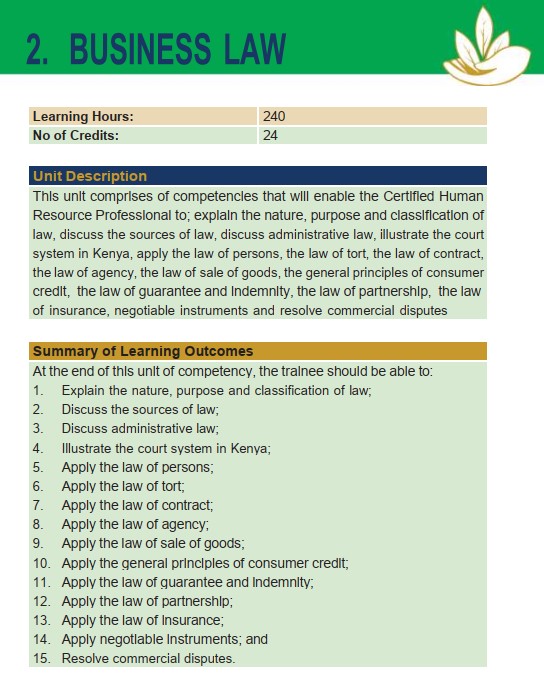
1. Nature, Purpose and Classification of Law
1.1 Definition of law
1.2 Functions/ purposes of law
1.3 Classification/types of law
1.4 The rule of law
1.5 Professional ethics and the law
1.6 Business ethics
1.7 Law and morality
2. Sources of Law
2.1 Meaning of sources of Law
2.2 The constitution
2.3 Acts of parliament/statutes
2.4 International law
2.5 Customary law
2.6 Judicial precedents/case law
2.7 Common law
2.8 Law of Equity
2.9 Statutes of general application
2.10 Subsidiary legislation/ by laws
3. Administrative Law
3.1 Definition and functions of administrative law
3.2 Principles of natural justice
3.3 Effects of breach of natural justice
3.4 Judicial review
3.5 Alternative dispute resolution mechanisms
3.6 Role of Ombudsman in Administrative Justice
4. The Court System in Kenya
4.1 The supreme court of kenya
4.2 The court of appeal
4.3 The high court
4.4 Specialised court – (Employment and labour relations court/land and environment court)
4.5 The Kadhi’s court
4.6 The Magistrate’s courts
4.7 Tribunals
4.8 Officers of the court
4.9 Judicial Service Commission
5. Law of Persons
5.1 Introduction to the law of persons
5.2 Types of persons
5.3 Nationality
5.4 Domicile
5.5 Marriage
5.6 Adoption
5.7 Legitimation
5.8 Guardianship
5.9 Mentally disordered persons
5.10 Proceedings against the state
5.11 Corporations
5.12 Partnerships
6. Law of Tort
6.1 Introduction to the Law of Tort
6.2 Capacity of parties
6.3 General defenses
6.4 Negligence
6.5 Trespass
6.6 Nuisance
6.7 Defamation
7. Law of Contract
7.1 Definition and types of contracts
7.2 Formation of contracts
7.3 Elements of a contract
7.4 Realisation of a contract
7.5 Vitiating Factors
7.6 Discharge of a contract
7.7 Breach of contract
7.8 Remedies for breach of contract
7.9 Limitation of Actions
8. Law of Agency 8.1 Definition of an agent
8.2 Classification of an agent
8.3 Creation of agency relationship
8.4 Duties of an agent
8.5 Rights of an agent
8.6 Liability of an agent to third parties
8.7 Termination of an agency relationship
9. Law of Sale of Goods
9.1 Nature of sale of goods
9.2 Capacity of parties
9.3 Transfer or passing of property
9.4 Caveat emptor
9.5 Duties of parties
9.6 International trade contracts
10. General Principles of Consumer Credit
10.1 Definition of consumer credit
10.2 Advantages and disadvantages of consumer credit
10.3 Consumer debt basics
10.4 Credit card basics
10.5 Debt repayment options and advice
11. Law of Guarantee and Indemnity
11.1 Introduction to indemnity and guarantees
11.2 Contract of indemnity
11.3 Contract of guarantee
11.4 Continuing guarantee
11.5 Rights of the guarantor/surety
11.6 Discharge of a guarantor/surety
12. Law of Partnership
12.1 Meaning of partnership
12.2 Formation of partnership
12.3 Partnership deeds and agreements
12.4 Law of partnership
12.5 Types of partnerships
12.6 Relationship of partners
12.7 Duties of partners
12.8 Relation of partners to third parties
12.9 Assignment of shares in partnership
12.10 Liabilities of incoming and outgoing partners
12.11 Dissolution
13. Law of Insurance
13.1 Introduction to the law of insurance
13.2 Regulatory framework of insurance
13.3 Parties to an insurance contract
13.4 Elements of insurance
13.5 Principles of Insurance
13.6 Essential elements of an insurance contract
13.7 Formation of an insurance contract
13.8 General characteristics of insurance
13.9 Types of insurance
13.10 Termination of an insurance contract
14. Negotiable Instruments
14.1 Introduction to negotiable instruments
14.2 Negotiable instruments
14.3 Bills of exchange
14.4 Promisory notes
14.5 Bailment
14.6 Lien
14.7 Letter of hypothecation
14.8 Letter of professional undertaking
15. Resolution of Commercial Disputes
15.1 Introduction to disputes settlement
15.2 Methods of resolving disputes or (Litigation and ADR)
15.3 Alternative disputes resolution Mechanisms
15.4 International commercial arbitration
